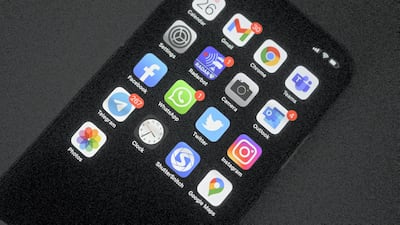The deadlock between the Indian government and Twitter over new restrictions on social media companies may be easing, but analysts say the dispute is the beginning of a precarious chapter for internet freedom in the world's largest democracy.
The government last week issued a final warning, calling on the US-based microblogging site to conform with new laws that require social media companies to appoint local officers for the redress of grievances.
Twitter refused to comply and missed a deadline, but a representative this week told The National that it was "making every effort to comply with the new guidelines".
Social media companies such as Google and Facebook already follow the new intermediaries rules, established by New Delhi in February as part of an executive order that deals mainly with surveillance and censorship.
The rules – that took effect from May 25 – require platforms to remove content within 36 hours after the government deems it illegal for reasons that may include threats to the sovereignty and the integrity of India, morality, libel or incitement to an offence.
They also require companies to trace the originator of such messages, including on encrypted messaging apps such as WhatsApp and Signal.
Local officers of the technology companies will be held criminally liable for non-compliance under the new law, ending the legal protection social media businesses previously enjoyed for hosting third-party content.
Analysts said the laws give Prime Minister Narendra Modi's government arbitrary powers to police India's internet and could be usedagainst critics, echoing claims that the right-wing Bharatiya Janata Party government is becoming increasingly authoritarian.
"The intermediaries rules will fundamentally and negatively affect the way millions of Indians use the internet, by unreasonably restricting the constitutional fundamental right to privacy, freedom of speech, and access to information," Apar Gupta, digital rights campaigner at India's Internet Freedom Foundation, told The National.
He said the new law would probably have "a chilling effect on free speech", particularly among dissenters and critics of government.
Pawan Duggal, an expert on cyber law in India, said that the rules enable the government to control the internet and could be used against opponents in absence of effective review.
"Unfortunately, large checks and balances which ought to be there in the rules are clearly missing," Mr Duggal told The National.
Since Mr Modi’s Hindu nationalist BJP came to power in 2014, opposition political movements have suffered in a crackdown on civil rights, including the jailing of campaigners, environmentalists and academics.
In March, US NGO Freedom House downgraded India from a "free" to "partly free" democracy, and the V-Dem Institute in Sweden said India had become an "electoral autocracy".
With about 700 million users, India is one of the largest internet markets for global technology companies.
India topped the list of countries imposing internet shutdowns, accounting for 70 per cent, or 109 of the 155 internet blackouts reported around the world in 2020.
It also banned more than 200 Chinese websites and applications last June, including video-sharing app TikTok, as it sought to punish Beijing over a Himalayan border clash in which more than 20 Indian soldiers were killed.
While WhatsApp challenged the legislation in court as a breach of privacy laws, Twitter's pushback came in the form of defiance, refusing to appoint local officers and publicly criticising the laws, which it said "inhibit free and open public conversation".
The government said the laws were necessary for protecting users and denied allegations of controlling free speech.
Twitter and the Indian government have been at odds over regulation for years, but their dispute took off after New Delhi ordered it to delete hundreds of tweets supporting a farmers' protest in January.
Last month, the government asked Twitter to remove content critical of Mr Modi's handling of the most recent wave of the coronavirus pandemic, in which millions of Indians struggled to get oxygen and medicines.
New Delhi accused Twitter of "unwillingly, grudgingly and with great delay" complying with the take-down orders, which the social media company said were often arbitrary.
But the dispute reached a tipping point in May, when Twitter labelled tweets by members of Mr Modi’s party as manipulated, triggering a fierce response from the government in the form of police teams at its Indian offices to serve notices for investigation.
Twitter said Mr Modi’s government was using intimidation and expressed concern about the safety of its staff.
Last week, the social media company briefly removed verified badges, known as blue ticks, from the accounts of Vice President Venkaiah Naidu and Mohan Bhagwat, chief of the powerful paramilitary Hindu right-wing Rashtriya Swayamsevak Sangh (RSS).

Mr Modi is a lifelong member of RSS, an ideological mentor of the ruling BJP.
Although Twitter has only 17 million users in India – a small number compared with Facebook’s 410 million users – it exerts tremendous influence on public opinion and helps to shape the political narratives pushed by the news media.
Mr Modi and his party use social media platforms, including Twitter, extensively to connect with the masses.
The prime minister boasts more than 200 million followers across platforms.
He is one of the highest-profile global politicians on Twitter, with 70 million followers.
But critics accuse his party of running co-ordinated misinformation campaigns and at times blamed right-wing supporters of spreading fake news and religious bigotry, often with impunity.
Experts said any future resistance from social media companies in the form of negative labelling, such as putting "manipulative media" tags on BJP content, will severely disrupt the party's communication model and its image.
"If accounts are blocked, be it of ruling or opposition parties, it definitely impacts the image," Sanjay Kumar, political analyst and co-director of Lokniti, a research programme at the Centre for the Study of Developing Societies in Delhi, told The National.

